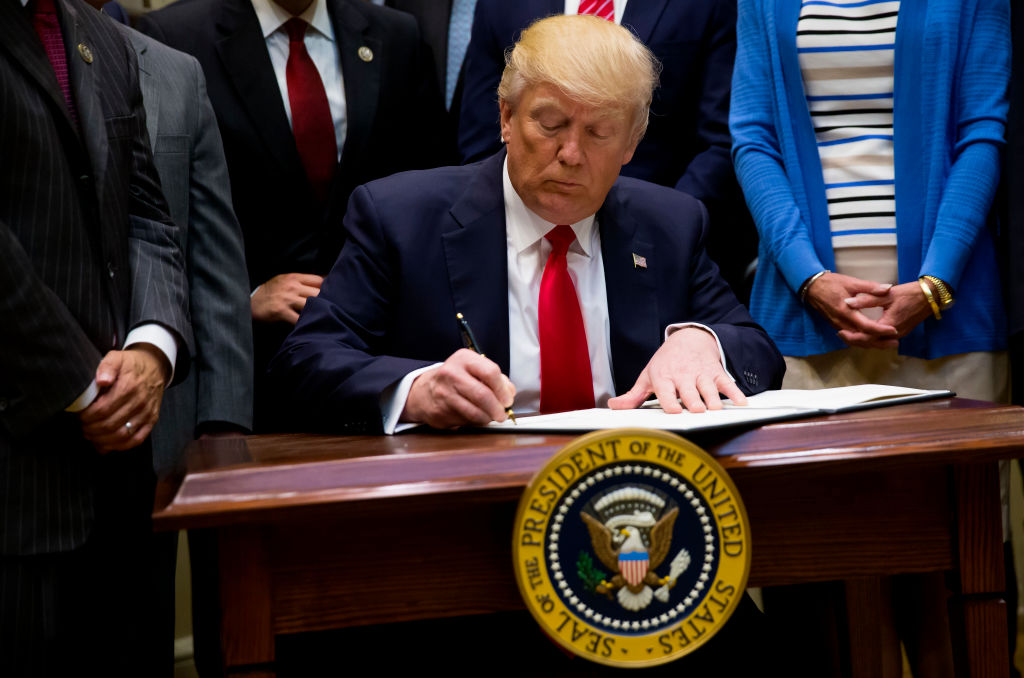Trump to sign executive order aiming to allow churches to endorse political candidates


A free daily email with the biggest news stories of the day – and the best features from TheWeek.com
You are now subscribed
Your newsletter sign-up was successful
On Thursday, President Trump will sign an executive order to ease restrictions on tax-exempt churches and nonprofits endorsing political candidates and providing contraception coverage in employee insurance plans, the White House said Wednesday night. Unlike in a draft of the executive order leaked in February, this one will not free faith-based organizations and companies to refuse service to gays and lesbians or allow federal contractors to discriminate against LGBT employees.
The executive order, which Trump will sign at a ceremony with conservative Christian leaders, will say "it is the policy of the administration to protect and vigorously promote religious liberty," but the only specific parts will be the broad "regulatory relief" on the already weakened Obama-era contraception mandate and the new order that the Internal Revenue Service "exercise maximum enforcement discretion to alleviate the burden of the Johnson Amendment," a little-enforced 1954 rule in the U.S. tax code that prohibits churches and charities from directly supporting or opposing candidates, if they want to be exempt from paying taxes.
Days after taking office, Trump promised he would "get rid of and totally destroy the Johnson Amendment," a longtime goal of some evangelic Christian leaders. Scrapping the Johnson Amendment would take an act of Congress, and House Republicans say they want to ax it as part of their tax overhaul plan. Many clergy members oppose stripping the amendment, saying they don't want to endorse candidates from the pulpit.
The Week
Escape your echo chamber. Get the facts behind the news, plus analysis from multiple perspectives.

Sign up for The Week's Free Newsletters
From our morning news briefing to a weekly Good News Newsletter, get the best of The Week delivered directly to your inbox.
From our morning news briefing to a weekly Good News Newsletter, get the best of The Week delivered directly to your inbox.
Trump's order will essentially tell the IRS to "carve as wide a berth as possible" in not enforcing the amendment, allowing churches to openly participate in political campaigns, at least as long as Trump is in office, Richard Garnett, a law professor at Notre Dame and an expert on church/state issues, tells The New York Times.
A free daily email with the biggest news stories of the day – and the best features from TheWeek.com
Peter has worked as a news and culture writer and editor at The Week since the site's launch in 2008. He covers politics, world affairs, religion and cultural currents. His journalism career began as a copy editor at a financial newswire and has included editorial positions at The New York Times Magazine, Facts on File, and Oregon State University.
-
 ‘One Battle After Another’ wins Critics Choice honors
‘One Battle After Another’ wins Critics Choice honorsSpeed Read Paul Thomas Anderson’s latest film, which stars Leonardo DiCaprio, won best picture at the 31st Critics Choice Awards
-
 Son arrested over killing of Rob and Michele Reiner
Son arrested over killing of Rob and Michele ReinerSpeed Read Nick, the 32-year-old son of Hollywood director Rob Reiner, has been booked for the murder of his parents
-
 Rob Reiner, wife dead in ‘apparent homicide’
Rob Reiner, wife dead in ‘apparent homicide’speed read The Reiners, found in their Los Angeles home, ‘had injuries consistent with being stabbed’
-
 Hungary’s Krasznahorkai wins Nobel for literature
Hungary’s Krasznahorkai wins Nobel for literatureSpeed Read László Krasznahorkai is the author of acclaimed novels like ‘The Melancholy of Resistance’ and ‘Satantango’
-
 Primatologist Jane Goodall dies at 91
Primatologist Jane Goodall dies at 91Speed Read She rose to fame following her groundbreaking field research with chimpanzees
-
 Florida erases rainbow crosswalk at Pulse nightclub
Florida erases rainbow crosswalk at Pulse nightclubSpeed Read The colorful crosswalk was outside the former LGBTQ nightclub where 49 people were killed in a 2016 shooting
-
 Trump says Smithsonian too focused on slavery's ills
Trump says Smithsonian too focused on slavery's illsSpeed Read The president would prefer the museum to highlight 'success,' 'brightness' and 'the future'
-
 Trump to host Kennedy Honors for Kiss, Stallone
Trump to host Kennedy Honors for Kiss, StalloneSpeed Read Actor Sylvester Stallone and the glam-rock band Kiss were among those named as this year's inductees



